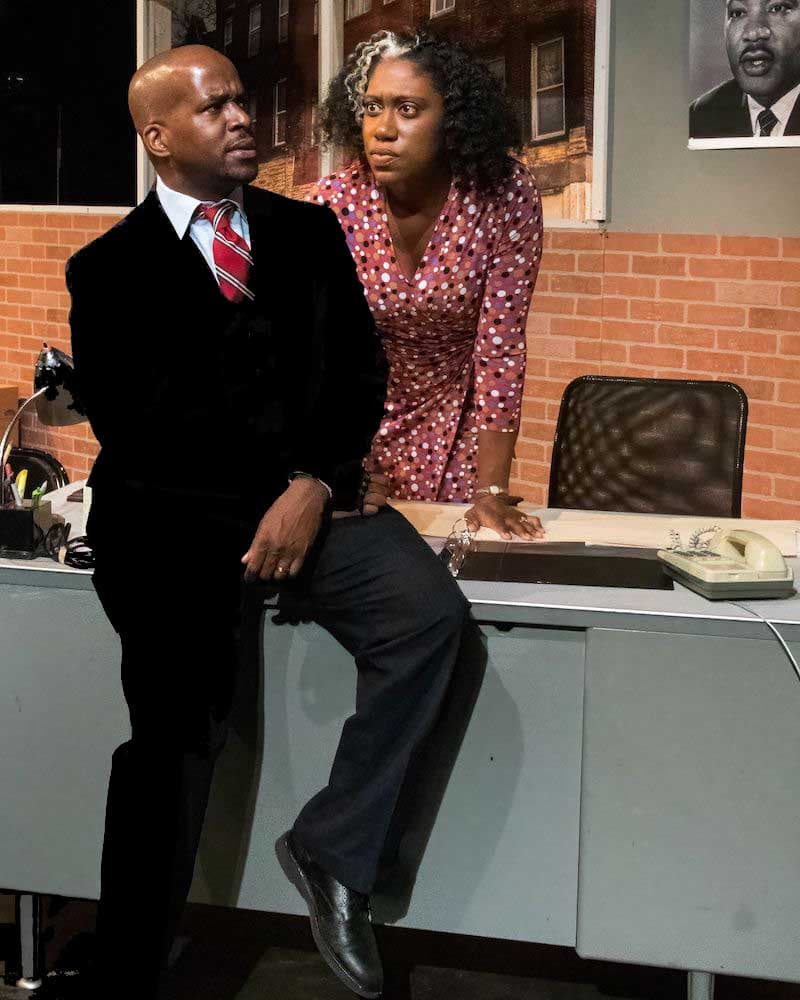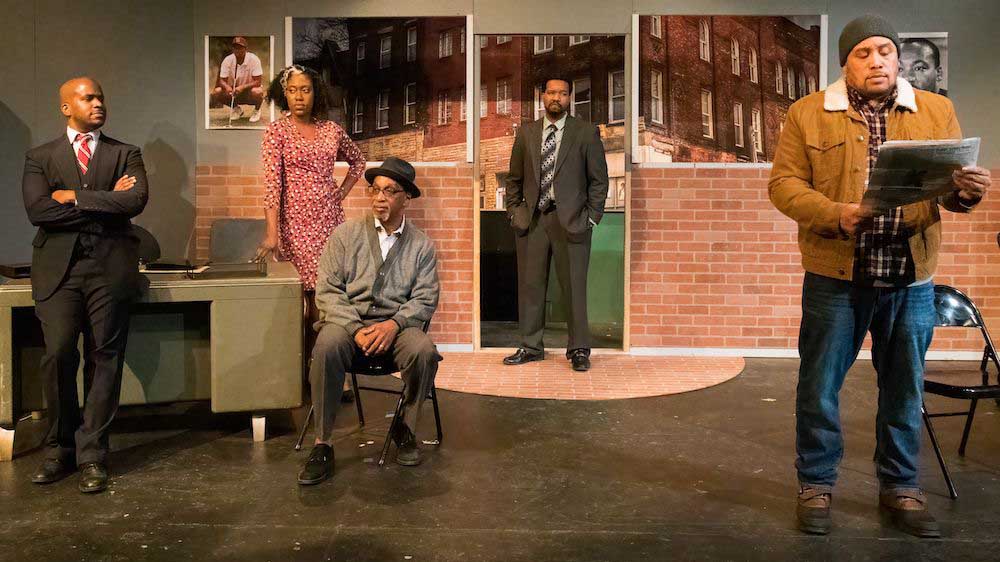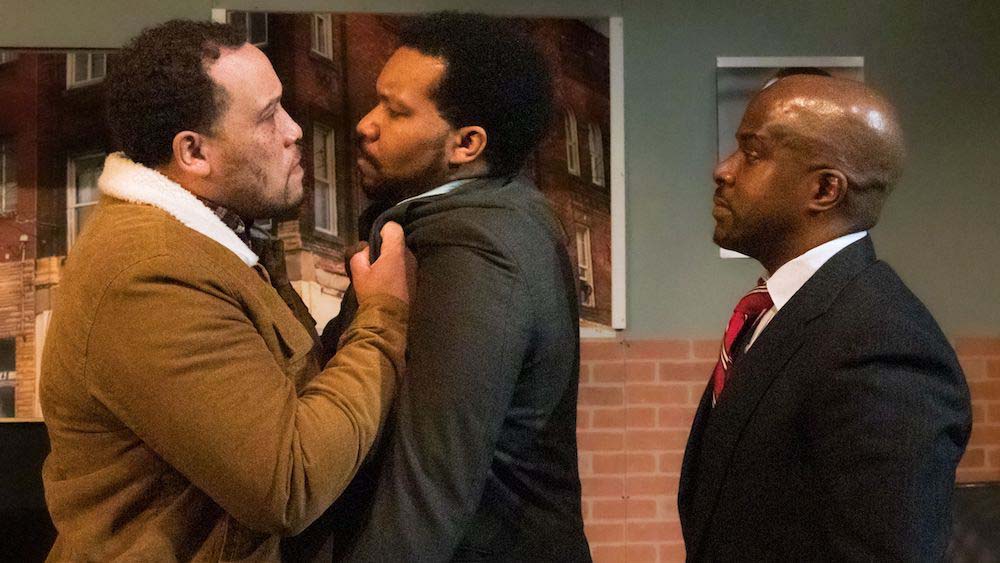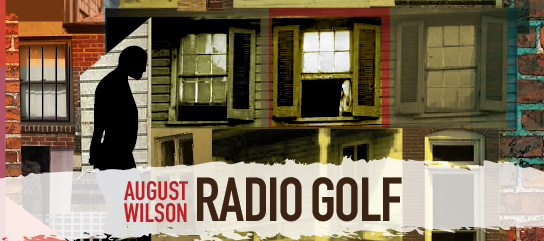As the tenth and last play in August Wilson’s majestic Pittsburgh Cycle of dramas highlighting Black history over the 20th century, Radio Golf completes an astonishing look back at African American life during each decade. Though others in the cycle, including Fences, Ma Rainey’s Black Bottom, and The Piano Lesson are better known, Wilson’s last drama offers another poignant look at Pittsburgh’s Hill District, where the playwright grew up, and its gentrification in the 1990s. Radio Golf, directed by Eleanore Tapscott, has been revived locally by the Peace Mountain Theatre, playing at The Writer’s Center in Bethesda.

Harmond Wilks (MarQuis Fair) has followed the plan his father laid out for him decades before: an Ivy League education and an assured position at the family’s successful real estate company. Now he has the opportunity to redevelop his fading neighborhood and, perhaps, make a credible run in Pittsburgh’s upcoming mayoral election. He’s supported by his equally ambitious wife, Mame (Nefertari Rasaq), and Harmond’s business partner, Roosevelt Hicks (Robert Freemon). It is 1997 — opportunities are opening for African American social and political entrepreneurs as never before.
And yet complex forces threaten the trio’s success. Some arise from the community itself. Elder Joseph Barlow (Addison Switzer) shows up to claim ownership of the only remaining physical obstacle to Harmond’s proposed new apartment and retail complex — a small house with a long history in the Hill neighborhood. It once belonged to Aunt Ester, a neighborhood spiritual healer who haunts many of Wilson’s plays. She is the common ancestor — and the moral conduit — for generations of African Americans. Her home at 1839 Wylie Avenue must be razed to make way for the Starbucks, Whole Foods, and Barnes & Noble that would be the anchors of Harmond’s redevelopment plan.

Sterling Johnson (Mack Leamon), a local laborer with a checkered past, arrives at Harmond’s office in search of work on the new building project. But when he learns about the proposed demolition, he recalls the importance of Aunt Ester’s home to the community and sides with Barlow.
As the project teeters, we begin to see just how delicate African American advancement continues to be in the 1990s. The government must declare the area blighted for Wilks to take advantage of federal funds. Hungry white developers lurk unseen, ready to avail themselves of tax incentives if they can claim to have a minority partner, no matter how little the partner gets. A new kind of exploitation is poised on the horizon.
The entire production takes place in the office of Wilks’s Bedford Hills Redevelopment Inc., a bare-bones storefront location wonderfully realized by Set Designer Steve Leshin. The office walls are festooned with posters of heroes: Martin Luther King hangs in back of Harmond’s desk and Tiger Woods hovers over Roosevelt’s. Outside the office, we glimpse rows of brownstone buildings, a bit rundown but still redolent of the bustle that once characterized the neighborhood.

The tug and pull of past and future, chaos and order, and moral choices propels Radio Golf forward. But the play does not provide equal opportunities for all its characters to explore these critical forces. Elder Barlow is the most richly written part, and Switzer makes the most of the humor, humility, and slyness inherent in the role. Always a gentleman, he nonetheless steadily works to gum up Wilks’s and Hicks’s dream project. Sterling, too, has choice lines and a quirky, hard-won moral authority that Leamon exploits. Robert Freemon’s Roosevelt is a glorious ball of nervous energy rolling quickly forward with scarcely a nod to the past. A golf fanatic, he recognizes the sport’s power to insinuate himself into a world of wealthy white businessmen.
Curiously, the roles of Harmond and Mame Wilks are the flattest of all. While MarQuis Fair and Nefertari Rasaq do all they can to breathe life into these central characters, Harmond, especially, lacks the eloquence and depth that could lend a more profound emotional charge to his choices. One wonders whether Wilson, who died shortly after the play premiered in 2005, would have tweaked Harmond enough to achieve greater complexity.
Nonetheless, Radio Golf shows again Wilson’s genius in plumbing his native Pittsburgh for stories that somehow capture the ethos of entire decades of the African American experience. What would Wilson have made of the first two decades of the new century? We only wish he were still here to sort it out for us.
Running time: Two hours 30 minutes with one 15-minute intermission
Radio Golf runs through February 27, 2022, presented by Peace Mountain Theatre Company performing at The Writer’s Center, 4508 Walsh Street, Chevy Chase, MD. Tickets ($26; $18 student and military) are available online.
COVID Safety: The Writer’s Center COVID Safety Policy is here.
The Radio Golf program is online here.





